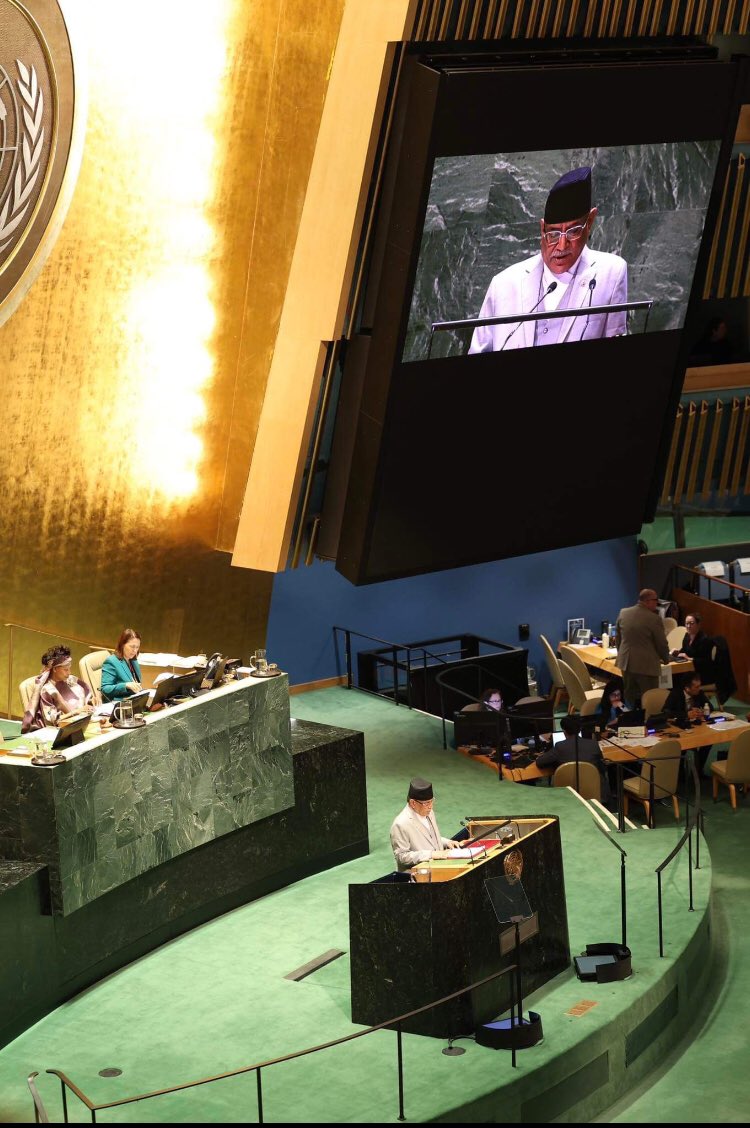

Nepal Prime Minister Pushpa Kamal Dahal addressing the General Debate of the 78th Session of the United Nations General Assembly on Thursday.
Kathmandu: Nepal Prime Minister Pushpa Kamal Dahal has warned that global warming and climate change has endangered the lives and livelihoods of millions of people living downstream of the Himalayas.
“The Himalayas are the source of freshwater for over two billion people,” Dahal said, addressing the General Debate of the 78th Session of the United Nations General Assembly on Thursday.
“Global warming has induced rapid receding of ice in our Himalayas. It has not only eroded the health of our mountains but also endangered the lives and livelihoods of millions of people living downstream.”
Dahal’s warning has come at a time when several studies have shown that deposits of snow in the Himalayas are fast depleting, putting pressure on availability of freshwater for the people of south Asian countries, who constitute a quarter of global population.
“Water sources in the high mountains are important not only for livelihoods and other demands in the immediate vicinity but also for the distant downstream areas that are heavily reliant on meltwater originating from mountains for agricultural, domestic, and industrial uses,” said the International Centre for Integrated Mountain Development (ICIMOD), an intergovernmental knowledge and learning centre working on behalf of the people of the Hindu Kush Himalaya (HKH), in its recent report. “Glaciers and snowmelt provide a buffer for downstream irrigation demand in the spring season , and it is very likely that the dependency on them will increase in future.”
The report entitled, “Water, ice, society, and ecosystems in the Hindu Kush Himalaya: An outlook’ unveiled in June states that the HKH glaciers have vanished at a staggering rate, disappearing 65 percent faster between 2011 and 2020 compared to the previous decade.
The report revealed that the HKH glaciers could lose up to 80 percent of their current volume by the end of the century if current emissions trajectories continue.
It has also blamed climate change for a number of different slow hazards such as sedimentation and erosion and fast-onset hazards such as floods and glacial lake outburst floods [GLOFs]) which it says are occurring in the same watersheds, frequently at the same time, and often also in a cascading manner.
This, according to the report, is complicating the nations’ ability to implement early warning and adaptation measures.
In August, torrential rains, cloudbursts, floods, and landslides wreaked colossal damage and claimed several lives in Himachal Pradesh, India’s Himalayan foothill provinces. Experts blamed climate change besides unmanaged construction activities for the disasters.
In July, flooding in eastern Nepal killed around one and half dozen people while damaging the infrastructure of 30 hydropower projects—13 operating and 17 under-construction and experts were quick to point out climate change as a major reason.
As South Asian countries, specially Nepal, are bearing the severe brunt of climate change, Nepali Prime Minister Dahal warned that climate change has assumed a crisis proportion. “The clock is ticking. Our inaction or little action will surely invite disastrous consequences for humanity,” he said.
Prime Minister Dahal stressed on the need for easy access to climate finance to take low-carbon and climate resilient development pathways. “Equally crucial are the early operationalization of the loss and damage fund, fulfilling the target of the $100 billion commitment as well as doubling up on climate finance adaptation,” he said.
Besides highlighting the impact of climate change on Nepal and South Asian countries, Dahal also called for a fair and equitable international trading regime that benefits the Least Developed Countries (LDCs) like Nepal.
Currently, Nepal is the chair of LDCs whose total number currently stands at 48. “Coordinated policies aimed at debt relief, debt restructuring, and debt swap ….must be translated into reality,” Dahal said.
Union Minister of Coal and Mines G Kishan Reddy on Tuesday held an inter-ministerial meeting…
India's largest automobile in-plant railway siding at Maruti Suzuki's Manesar facility started operation on Tuesday,…
Google on Tuesday unveiled its Safety Charter for India's AI-led transformation, at the "Safer with…
The human rights organisation of the Baloch National Movement (BNM), Paank, has published its most…
The Israel Defence Forces (IDF) on Tuesday claimed that it has killed Iran's senior-most military…
Amid escalating conflict between Iran and Israel, the Ministry of External Affairs (MEA) on Tuesday…